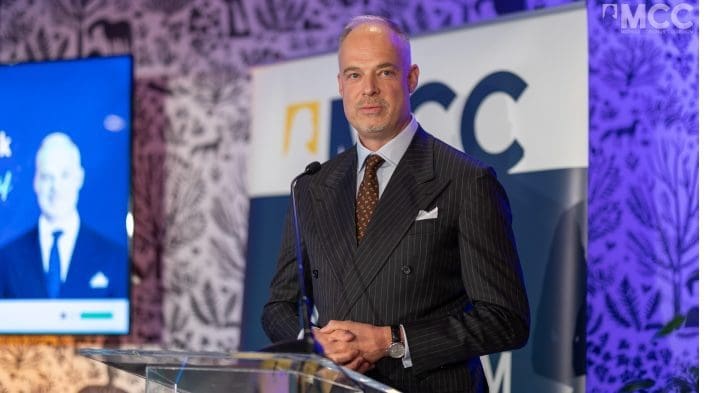In the course of a month-long programme, Mathias Corvinus Collegium invited the ministers of the newly formed Hungarian government to discuss the challenges they and their departments face in these turbulent times, and to speak about their goals and plans as ministers. The most recent guest speaker was Kristóf Szalay-Bobrovniczky, Hungary’s newly appointed Minister of Defence.
The minister addressed three distinct, yet interconnected topics in his lecture: the Russia-Ukraine war and its consequences, NATO’s Madrid summit, and Hungary’s ongoing military development programme.
Regarding the war in Hungary’s neighbourhood, he reiterated that the country’s position has been clear from the beginning: to stay out of the war and pursue Hungary’s national interests. The landslide electoral victory showed that this position of the governing party resonated well with the vast majority of voters who gave the government a strong mandate to act on these principles. This strong mandate is also important because Hungary is almost alone with its peace-advocacy position in Europe, he emphasized. He also stressed that such aggression against a sovereign state was unprecedented in Europe since the Second World War, which clearly defines the Hungarian position that we are on the side of the victim.
Hungary is almost alone with its peace-advocacy position in Europe
On the current state of the war, he explained that the Russian blitzkrieg plan quickly collapsed at the beginning of the offensive and the Russians are now concentrating on Eastern Ukraine, where they are seeing more successes, such as achieving air superiority. He said that Russian war casualties are around 15,000 while Ukrainians have lost around 35,000 troops, and the number of wounded could be three times that. The high number of Ukrainian casualties also points to the fact that even though the Ukrainians continue to receive Western weapons, there are fewer and fewer people to operate them.

Hungary will reach 2 per cent of its GDP as defence expenditure as early as next year
Talking about NATO, the Minister highlighted Hungary’s contribution to the Alliance‘s capabilities and noted that the country will reach 2 per cent of its GDP as defence expenditure as early as next year. Regarding NATO’s Madrid summit, Mr. Szalay-Bobrovniczky explained that although the Alliance’s new Strategic Concept declares Russia the ‘most significant, direct threat’ facing the alliance, partly thanks to insistence on the part of Hungary, the threats posed by migration and terrorism have also been included. The accession of Finland and Sweden is a historical moment, the Minister underscored, which is adding 1300 kilometres to the NATO-Russian border. He added that the setting up of an innovation fund among 22 NATO countries, including Hungary, was also decided at the Summit.
Finally, the Minister outlined the current situation of the Hungarian force development programme. He highlighted that his objective is to accelerate the pace of development, modernization, and the recruitment of volunteers. The Minister presented some of the latest acquisitions of the Hungarian Defence Forces such as the Norwegian-US air defence missiles (NASAMS); the Lynx armoured vehicles (which will be manufactured in Hungary along with the Gidran combat vehicle) and the Leopard tanks, of which 44 have been purchased. He also stressed that the aim is not only procurement and modernization–on which the country spent 48 per cent of its defence budget last year–but also the revival of the Hungarian defence industry. The development of a decisive armed force is the cornerstone for Hungary to pursue a strong and sovereign defence policy, concluded the Minister of Defence.







